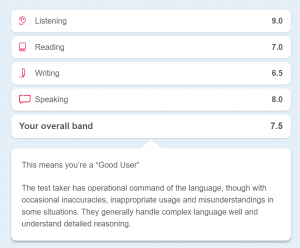Summer is just behind the corner which means the end of this course is also right there. The spring has gone by incredibly fast and it has surely been quite fruitful. I’ve learnt a lot about writing techniques, vocabulary, active learning and listening and mainly I feel really confident about my language level now. I know I am very capable of learning more and becoming better – I think I’ve made a great choice going to New Zealand for my exchange. At first I thought it would be a little bit of a boring choice as it is an English speaking country but now I don’t think so anymore at all. It will give me plenty of lessons linguistically and in many other ways as well. I am also looking forward to learning more about Maori language and culture.
This is my final review of the course with also my final adjustments to the hours I’ve spent on this course. I did not completely follow my initial plan, but ironically that wasn’t in the plan. This whole time the actual masterplan was to adjust the planned hours as needed, because then they would actually provide me what I actually need at this moment. Now I understand this is very important to acknowledge in language learning because it is a process and it is not a linear process – just like so many things in physical geography, my field of studies.
10 h administrative work – Done by now! (Tomorrows session truthfully, but you know…)
15 hours of academic reading – Done! I did approximately 7 hours by the first review and after that I’ve been reading another academic book in English about topography and environment. I’ve spent about 15 hours on this book, of which I will use 8 into this course.
10 hours academic writing – Done! I took away the two hours i added into this in the second review since I used it all up in the reading news section. I think 10 hours is a good amount of practice and it surely has done it’s most important job – it has given me the tools to keep bettering by writing skills.
10 hours support groups + blog – This one is done! I did tasks in the support groups and took the tools they offered into use. I few of the hours I’ve spent writing and drafting the blog, especially on the bit I wrote about the accessibility of information. In that text I tried to keep up with what I’ve learnt and I think it is better than it would be before this course.
7 hours social learning with friends – Done! I’ve run into people from various countries and backgrounds and the latest has been the chats with my sister and her Indian husband.
10 hours of reading – Done! I fell ill with covid and after the worst of it I submerged myself into the magical and so realistic book I chose to read which is Shantaram. I still think it is a masterpiece and it is written in such a wonderfully beautiful language that it can only be recommended by me.
6 hours of watching related documentaries – This one has been done for a while now. Including documentaries about nature mainly.
10 hours of learning vocabulary -science and geography especially – I still feel this one is difficult to put into hours, but I think I am done now. In addition to adding words to my own little excel sheet, I’ve been looking through and testing myself with completely new words from the term bank of science. In there I’ve been looking through the categories of geology and environmental sciences as it doesn’t have a section for geography itself. It would be difficult to create though since geography covers almost anything that can be studied from a spatial aspect.
10 hours of movies and TV (no subtitles) – Done, done, done! I’ve been watching downton abbey, the oscars, the outlander, the black list and so much more. Honestly I think in this the most important thing is to actively listen and spot new words and phrases and to have variety in what you’re watching. I think I have it as there are plenty of accents and areas represented in these shows.
10 hours of grammar learning tasks – Done! I have done so many crosswords and other types of excercises as well. One of the best websites for this was the one I found from the ALMS moodle page, which is english grammar online. I’ve used some other pages as well, but I don’t remember them all as I did scan through a few worse pages as well.
10 hours of reading news in English – I added two extra hours into this as I got myself submerged in the news by accident, which didn’t even happen to me. It was when an Indian climber, Anurag Maloo, fell into a crevasse while climbing Mt. Annapurna in Nepal I also fell into a rabbit hole of mainly Nepalese and Indian newspapers and articles about mountain climbing and especially about this rescue operation. Thankfully it was successful and there is still hope mr. Maloo will survive this unbelievable battle he still is in.
This is it, this is everything. I’ve counted into this course these 108 hours I’ve spent actively learning English in various settings. I have to say at first I thought this would be a lot of work, but eventually I had to choose which hours to “use” to this course. After all I think it was easy to get these hours done and I do use English much more in my life than I thought before. A lesson to learn here was to acknowledge the language around me and to actively keep learning.
